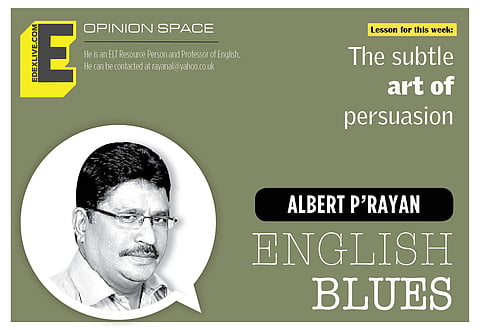

Persuasion is an art. It is a powerful language too. Many have used the language for centuries to convince others to do something or to influence them. It is an effective communication technique. Every leader is expected to master it. A good leader is a master of persuasion. Great leaders know that it is not just what they say that is important but how they say it. The manner (of saying something) is more important than matter. Julie Foudy, former captain of the US Women’s National Team and one of the most accomplished female soccer players in the world, says: “You don’t need a degree in a business organisation or be trained in the finer arts of persuasion. You just need to believe you can lead. So start there. Start believing.”
Persuasion skills are important not only for leaders and marketing people but also for everyone who wants to change preconceived notions or ideas of people they relate with. Is ‘persuasion’ a positive or negative term? It all depends on what purposes we try to persuade others for. Persuasion can be used for positive as well as for negative purposes. Unfortunately, only negative examples often come to mind. We are reminded of various advertisements that use persuasive techniques to sell products or services or demagogues who try to convince the audience with their empty promises and tall claims. Persuasion can be treated as a synonym of a ‘positive force’. It is a powerful positive force. Parents persuade their children to do the right thing. Writers use persuasive techniques to present their arguments in order to sway readers to a particular point of view. In short, persuasion skills can be used to improve the lives of those with whom we relate.
What techniques do effective persuaders use to convince others? They use anecdotes, empathy, emotive language, catchy and convincing phrases, chatty style, rhetorical questions, repetition, opinions as facts, opinions of experts, etc. They don’t use phrases such as ‘I think’, ‘It looks’, ‘It seems to me’, and ‘It is possible’ as they indicate a lack of confidence. Emotive language, also called emotional language, is word choice that is used to evoke emotion and leads to action. Look at these examples:
You should take this online course. It will help you get a good job with a high salary. All those who have taken the course have been well placed in reputed organisations.
Farmers are the backbone of the Indian economy. Without farmers, we can’t survive. We should support the causes of farmers who protest against farm bills.
In the examples above, some emotive words and phrases have been used to convince readers or listeners. The word ‘farmers’ has been used four times in the second sentence as repetition is a technique in persuasive communication. Here are some useful phrases that can be used in persuasive communication:
I am sure you will like it.
I am certain...
I am totally convinced that…
If I were you, I would…
Though it may seem...
We need to be cautious as some people try to exploit others by using the emotive language to their advantage.
